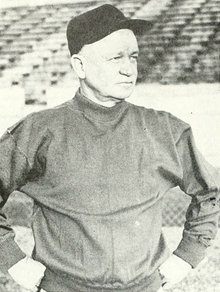 Alexander from The 1944 Blue Print | |
| Biographical details | |
|---|---|
| Born | June 6, 1889 Mud River, Kentucky, U.S. |
| Died | April 23, 1950 (aged 60) Atlanta, Georgia, U.S. |
| Playing career | |
| 1911–1912 | Georgia Tech |
| Position(s) | End,[1] quarterback[2] |
| Coaching career (HC unless noted) | |
| Football | |
| 1920–1944 | Georgia Tech |
| Basketball | |
| 1919–1920 | Georgia Tech |
| 1921–1924 | Georgia Tech |
| Administrative career (AD unless noted) | |
| 1920–1950 | Georgia Tech |
| Head coaching record | |
| Overall | 134–95–15 (football) 36–38 (basketball) |
| Bowls | 3–2 |
| Accomplishments and honors | |
| Championships | |
| Football 1 National (1928) 2 SIAA (1920–1921) 3 SoCon (1922, 1927–1928) 3 SEC (1939, 1943–1944) | |
| Awards | |
| Football AFCA Coach of the Year (1942) Amos Alonzo Stagg Award (1947) SEC Coach of the Year (1939) | |
| College Football Hall of Fame Inducted in 1951 (profile) | |
William Anderson Alexander (June 6, 1889 – April 23, 1950) was an American football player and coach. He served as the head football coach at the Georgia Institute of Technology from 1920 to 1944, compiling a record of 134–95–15. Alexander has the second most victories of any Tech football coach. Alexander's 1928 Georgia Tech Yellow Jackets have been recognized as national champions by a number of selectors. Alexander was the first college football coach to place his teams in the four major post-season bowl games of the time: Sugar, Cotton, Orange and Rose. His teams won three of the four bowls. The 1929 Rose Bowl win, which earned his team the national championship, is the most celebrated because of the wrong-way run by California's Roy Riegels. Alexander was also the head basketball coach at Georgia Tech for four seasons from 1919 to 1924. He was inducted into the College Football Hall of Fame as a coach in 1951.
- ^ "Early Georgia Tech Football" (PDF). College Football Historical Society. 14 (1). November 2000.
- ^ "Georgia Tech Football Team of 1911". Archived from the original on August 11, 2016.